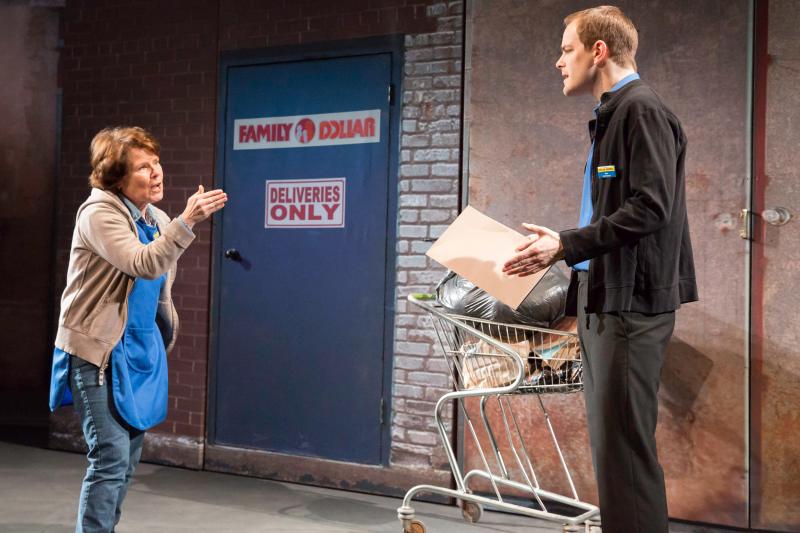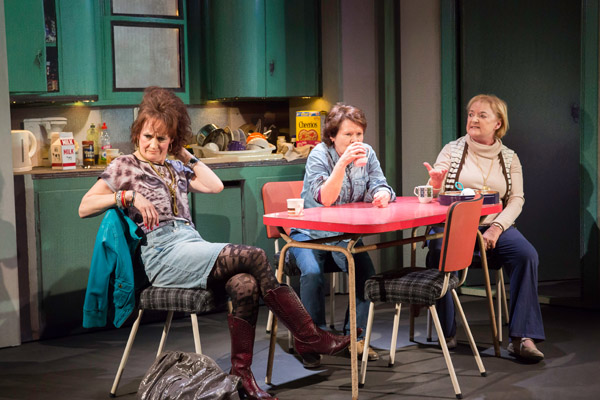Good People, Hampstead Theatre | reviews, news & interviews
Good People, Hampstead Theatre
Good People, Hampstead Theatre
Imelda Staunton stars in American import about class which is both funny and moving

This venue continues its promotion of American drama with another prize-winning play from across the pond. Hot on the heels of Gina Gionfriddo’s Rapture, Blister, Burn, with its casting of Emila Fox, comes this play by David Lindsay-Abaire, who won the 2007 Pulitzer Prize for his critically acclaimed Rabbit Hole, which also earned several Tony Award nominations and a film adaptation with Nicole Kidman.
This is that rare thing — an American play about classHer character is the vinegar-tongued Margie Walsh, who lives in Southie, a working-class neighbourhood in south Boston. She is a single mother with a disabled daughter. When she is fired from her job as a supermarket cashier, she decides to seek out an old flame, Mike (who is now a successful doctor and may or may not be the father of her daughter) in the hope of getting another job. Egged on by her friends Dottie and Jean, she decides to gatecrash a party he is holding at his posh house — but things turn out unexpectedly
Following a well-trodden theme, this is a play about the American Dream, the myth that says that anyone and everyone can be successful. Both Margie and Mike were both born in Southie, but while he got out, she is still stuck in poverty. She’s not a bad person, or to blame for her circumstances, but she does have precious few skills in a constricted jobs market. But when she meets Mike again in his plush office, and hears about his charitable work, she becomes convinced that he is Good People, a paragon.
 This is also that rare thing: an American play about class. When Margie goes to Mike’s house — and meets his beautiful young wife Kate — the gulf between middle-class respectability and working-class desperation is clear to see. Lindsay-Abaire writes in a crisp vernacular mildly peppered with expletives, and the story is neatly constructed, full of Act Two twists and turns. Characters which seemed unsympathetic in the first half transform themselves into aching human beings.
This is also that rare thing: an American play about class. When Margie goes to Mike’s house — and meets his beautiful young wife Kate — the gulf between middle-class respectability and working-class desperation is clear to see. Lindsay-Abaire writes in a crisp vernacular mildly peppered with expletives, and the story is neatly constructed, full of Act Two twists and turns. Characters which seemed unsympathetic in the first half transform themselves into aching human beings.
You might find yourself taking sides, as this is a moral play which stages a strong debate about the right way to behave, about social responsibility and about parental duty. If Margie is a bitter, charmless individual, she is also an unlucky one. Or is she? Has Mike’s success been due to good luck, or to his own hard work? Do some human beings deserve to fail?
But despite the serious issues, Good People is a comedy and the social awkwardness on stage provokes some moments of explosive laughter. With its strongly autobiographical element, Lindsay-Abaire’s story is both a love letter to the hard-working folk of Southie and a good draught of south Boston humour, dark, desperate and honest. If not everything about the inhabitants of Southie is appealing (they can be racist, sexist and every other ist), this play gives them a very good (perhaps too good?) image.
Jonathan Kent’s emotionally taut production is very entertaining, especially in Act Two, and Staunton (pictured above, with Lorraine Ashbourne as Jean and June Watson as Dottie) is feisty, with touches of iron and moments of softness. With Lloyd Owen as the smarmy Mike, Angel Coulby as the big-hearted Kate and Matthew Barker as Margie’s boss, this turns out to be a quietly moving show. If at first I doubted I could like this play, I ended up by loving it.
rating
Explore topics
Share this article
The future of Arts Journalism
You can stop theartsdesk.com closing!
We urgently need financing to survive. Our fundraising drive has thus far raised £49,000 but we need to reach £100,000 or we will be forced to close. Please contribute here: https://gofund.me/c3f6033d
And if you can forward this information to anyone who might assist, we’d be grateful.

Subscribe to theartsdesk.com
Thank you for continuing to read our work on theartsdesk.com. For unlimited access to every article in its entirety, including our archive of more than 15,000 pieces, we're asking for £5 per month or £40 per year. We feel it's a very good deal, and hope you do too.
To take a subscription now simply click here.
And if you're looking for that extra gift for a friend or family member, why not treat them to a theartsdesk.com gift subscription?
more Theatre
 Little Brother, Soho Theatre review - light, bright but emotionally true
This Verity Bargate Award-winning dramedy is entertaining as well as thought provoking
Little Brother, Soho Theatre review - light, bright but emotionally true
This Verity Bargate Award-winning dramedy is entertaining as well as thought provoking
 The Unbelievers, Royal Court Theatre - grimly compelling, powerfully performed
Nick Payne's new play is amongst his best
The Unbelievers, Royal Court Theatre - grimly compelling, powerfully performed
Nick Payne's new play is amongst his best
 The Maids, Donmar Warehouse review - vibrant cast lost in a spectacular-looking fever dream
Kip Williams revises Genet, with little gained in the update except eye-popping visuals
The Maids, Donmar Warehouse review - vibrant cast lost in a spectacular-looking fever dream
Kip Williams revises Genet, with little gained in the update except eye-popping visuals
 Ragdoll, Jermyn Street Theatre review - compelling and emotionally truthful
Katherine Moar returns with a Patty Hearst-inspired follow up to her debut hit 'Farm Hall'
Ragdoll, Jermyn Street Theatre review - compelling and emotionally truthful
Katherine Moar returns with a Patty Hearst-inspired follow up to her debut hit 'Farm Hall'
 Troilus and Cressida, Globe Theatre review - a 'problem play' with added problems
Raucous and carnivalesque, but also ugly and incomprehensible
Troilus and Cressida, Globe Theatre review - a 'problem play' with added problems
Raucous and carnivalesque, but also ugly and incomprehensible
 Clarkston, Trafalgar Theatre review - two lads on a road to nowhere
Netflix star, Joe Locke, is the selling point of a production that needs one
Clarkston, Trafalgar Theatre review - two lads on a road to nowhere
Netflix star, Joe Locke, is the selling point of a production that needs one
 Ghost Stories, Peacock Theatre review - spirited staging but short on scares
Impressive spectacle saves an ageing show in an unsuitable venue
Ghost Stories, Peacock Theatre review - spirited staging but short on scares
Impressive spectacle saves an ageing show in an unsuitable venue
 Hamlet, National Theatre review - turning tragedy to comedy is no joke
Hiran Abeyeskera’s childlike prince falls flat in a mixed production
Hamlet, National Theatre review - turning tragedy to comedy is no joke
Hiran Abeyeskera’s childlike prince falls flat in a mixed production
 Rohtko, Barbican review - postmodern meditation on fake and authentic art is less than the sum of its parts
Łukasz Twarkowski's production dazzles without illuminating
Rohtko, Barbican review - postmodern meditation on fake and authentic art is less than the sum of its parts
Łukasz Twarkowski's production dazzles without illuminating
 Lee, Park Theatre review - Lee Krasner looks back on her life as an artist
Informative and interesting, the play's format limits its potential
Lee, Park Theatre review - Lee Krasner looks back on her life as an artist
Informative and interesting, the play's format limits its potential
 Measure for Measure, RSC, Stratford review - 'problem play' has no problem with relevance
Shakespeare, in this adaptation, is at his most perceptive
Measure for Measure, RSC, Stratford review - 'problem play' has no problem with relevance
Shakespeare, in this adaptation, is at his most perceptive
 The Importance of Being Earnest, Noël Coward Theatre review - dazzling and delightful queer fest
West End transfer of National Theatre hit stars Stephen Fry and Olly Alexander
The Importance of Being Earnest, Noël Coward Theatre review - dazzling and delightful queer fest
West End transfer of National Theatre hit stars Stephen Fry and Olly Alexander

Add comment